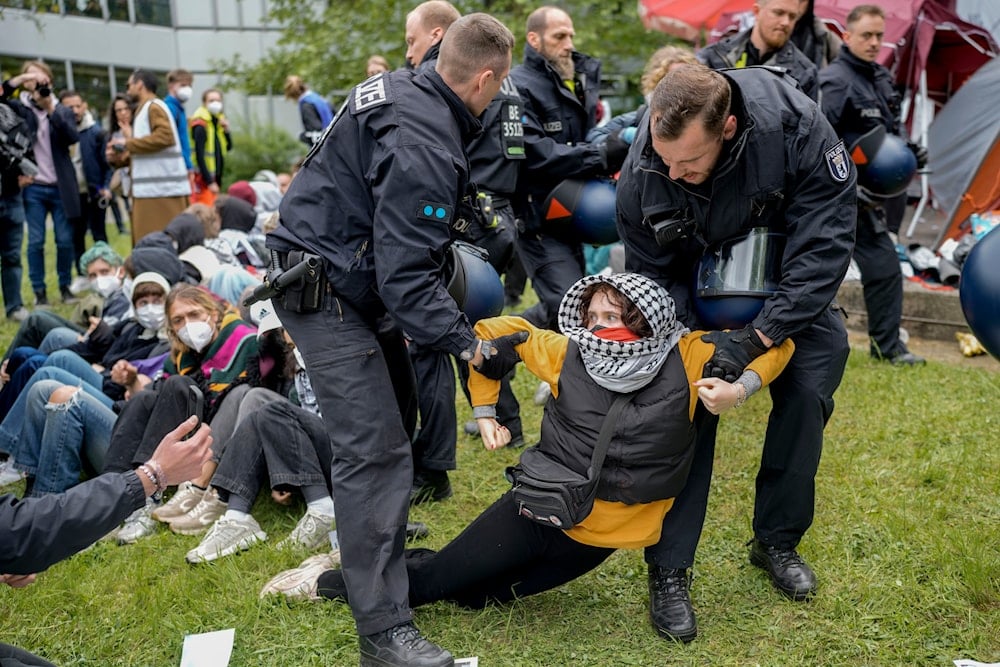Germany faces revolt over support for Israeli genocide in Gaza: NYT
Germany weighs a policy shift as cultural figures, lawmakers, and EU partners demand accountability for Berlin’s support of the Israeli entity amid Gaza atrocities.
-

A woman is carried away by police officers during a pro-Palestine demonstration by the group "Student Coalition Berlin" in the theater courtyard of the Freie Universität Berlin, in Berlin, Germany, Tuesday, May 7, 2024 (AP)
Germany’s long-standing support for the Israeli entity, rooted in what is called post-Holocaust guilt, is facing mounting domestic and international pressure as the atrocities in Gaza escalate. Chancellor Friedrich Merz now finds himself cornered, caught between Berlin’s historical narrative and a public increasingly unwilling to tolerate complicity in what many now view as war crimes.
As The New York Times' Steven Erlanger reports, the German public's view has shifted dramatically. Support for “Israel” is plummeting, especially in light of mass starvation, widespread destruction, and credible accusations of collective punishment in Gaza.
Even within Merz’s coalition, frustration is rising. The Social Democrats are openly calling for an end to arms exports to “Israel,” while leaders like Emmanuel Macron and Keir Starmer edge closer to recognizing Palestinian statehood, something Merz still opposes, insisting that “statehood must emerge from direct negotiations.”
Merz embarks on quiet shift
Despite his rhetorical hedging, Merz is under increasing pressure, including from pro-"Israel" hardliners within his own Christian Social Union. In response, he’s begun what Erlanger describes as a quiet shift, opting for backchannel diplomacy and private pressure.
According to a senior German official, Merz has had “several tense phone conversations with Netanyahu,” during which he urged the Israeli premier to open humanitarian corridors and accept a ceasefire. He also joined Macron and Starmer in pressuring US President Donald Trump to push Netanyahu into allowing more aid into the besieged Gaza Strip.
Suspension of EU-"Israel" association agreement considered
One of the most symbolic shifts under consideration is Germany’s potential support for a suspension of the EU-"Israel" association agreement, a framework that has facilitated years of cooperation with the Israeli entity in science, trade, and culture. The European Commission has even proposed restricting “Israel’s” access to the Horizon Europe research fund. Though still narrow in scope, such moves suggest a crack in the EU’s previously unified front.
Germany has also assisted in humanitarian airdrops over Gaza, while Foreign Minister Johann Wadephul was recently dispatched to the region to de-escalate growing tensions. While in occupied al-Quds, Wadephul warned, “This danger exists and both sides must work together to prevent it,” acknowledging the mounting risk of an EU–"Israel" rupture.
Upon his return, the German government issued a carefully phrased statement noting “slight progress” in humanitarian access but warned aid remains insufficient and “may be withheld by Hamas and criminal groups,” subtly maintaining the Israeli entity's preferred framing.
Meanwhile, internal pressure is intensifying. In a powerful rebuke, over 200 German cultural figures published an open letter titled “Don’t let Gaza die, Mr. Merz,” urging an immediate arms embargo on “Israel,” the suspension of the EU-"Israel" agreement, and an end to German complicity in the war.
During a visit to the occupied West Bank, Wadephul also stopped at the Church of St. George in Taybeh, which had been attacked by Israeli settlers, an understated but visible signal of German concern over settler violence in the occupied territories.
'We walk on eggshells'
Erlanger notes that Germany has shifted toward a more assertive foreign policy since the war in Ukraine, but the Israeli occupation remains a paralyzing exception. Claudia Major of the German Marshall Fund told The New York Times, “We walk on eggshells,” referencing Germany’s enduring fear of breaching "post-Nazi moral codes," even in the face of modern-day atrocities.
Following the October 2023 operation, German politicians and media rallied behind “Israel” under the slogan “Never again is now.” But as the death toll climbs and images of Gaza’s destruction circulate globally, that unity is splintering. A May 2025 survey by the Bertelsmann Foundation revealed only 36% of Germans now view “Israel” positively, down from 46% in 2021. Just one-third still believe Germany holds a “special responsibility” toward the entity, a major shift in postwar German sentiment.
Social Democrat MP Derya Turk-Nachbaur has called for aligning with France and the UK to increase EU-level pressure on “Israel", including possible suspension of the association agreement.
Policy experts are urging stronger action. Thorsten Benner of the Global Public Policy Institute suggests “targeted sanctions on extremist Israeli ministers,” similar to recent Dutch measures, a temporary halt to arms transfers, or medical evacuations of injured Gazan children to German hospitals.
"Mr. Merz has argued that Israelis listen to its bedrock supporters, like the United States and Germany, while discounting the criticism of countries like Sweden, Ireland and Spain, which had earlier recognized a Palestinian state," the piece concludes.

 5 Min Read
5 Min Read










